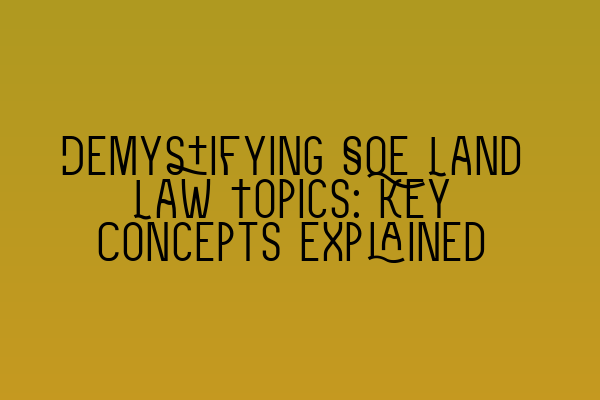Demystifying SQE Land Law Topics: Key Concepts Explained
Welcome to the SQE Property Law & Land Law blog at SQEPropertyLaw.com! As a solicitor, writer, and SEO expert, I am delighted to provide you with valuable insights into the complex world of land law. In this blog post, we will demystify some of the key concepts that frequently arise in the SQE Land Law examination.
1. Freehold and Leasehold
The concept of freehold and leasehold is fundamental in land law. Understanding the distinction between these two types of ownership is crucial. A freehold interest grants the owner absolute ownership of the property, while a leasehold interest gives the owner a temporary right to use the property for a specific period.
To deepen your understanding of freehold and leasehold, check out our related article: Understanding Freehold and Leasehold: A Comprehensive Guide.
2. Easements
An easement is a right that one person has over another person’s property. It allows the holder of the easement to use the land in a specific way, even if they do not own it. Examples of easements include rights of way, rights to light, and rights to access utilities.
If you would like to test your knowledge on easements, take a look at our practice exams: SQE 1 Practice Mocks: FLK1 FLK2.
3. Covenants
Covenants are promises made between landowners, imposing certain obligations or restrictions on the use of their land. There are positive covenants, which require the owner to do something, and restrictive covenants, which prohibit certain activities on the land.
To delve deeper into the world of covenants, explore our comprehensive preparation courses for SQE 1: SQE 2 Preparation Courses.
4. Mortgages
A mortgage is a legal agreement where a borrower uses their property as security for a loan. If the borrower fails to repay the loan, the lender has the right to sell the property to recover their money. Understanding the intricacies of mortgages is crucial for aspiring solicitors.
To enhance your understanding of mortgages, consider enrolling in our SQE 1 Preparation Courses: SQE 1 Preparation Courses.
5. Adverse Possession
Adverse possession allows a person to acquire ownership of land by possessing it in an open, continuous, and uninterrupted manner for a specified period. This concept often raises intriguing questions and challenges in land law.
To stay up-to-date with the latest SRA SQE Exam Dates and important updates, visit our website: SRA SQE Exam Dates.
Thank you for joining us for this insightful blog post on demystifying SQE Land Law topics. We hope it has provided you with clarity on some of the key concepts you may encounter in your exams. Remember, preparation is key, and our team at SQE Property Law & Land Law is here to support you every step of the way.
For more practice exam questions, study materials, and expert guidance, visit our website: SQEPropertyLaw.com.
